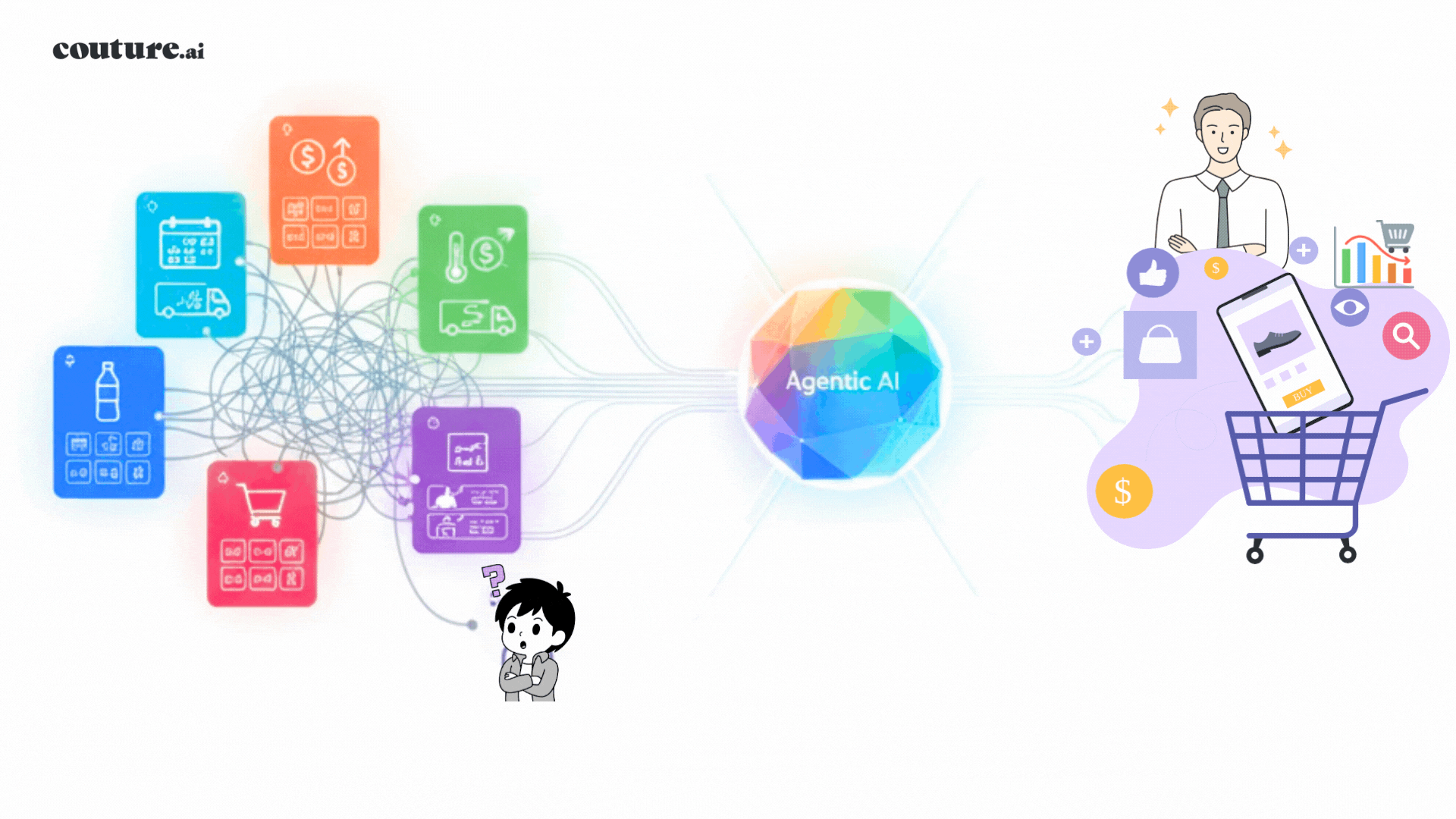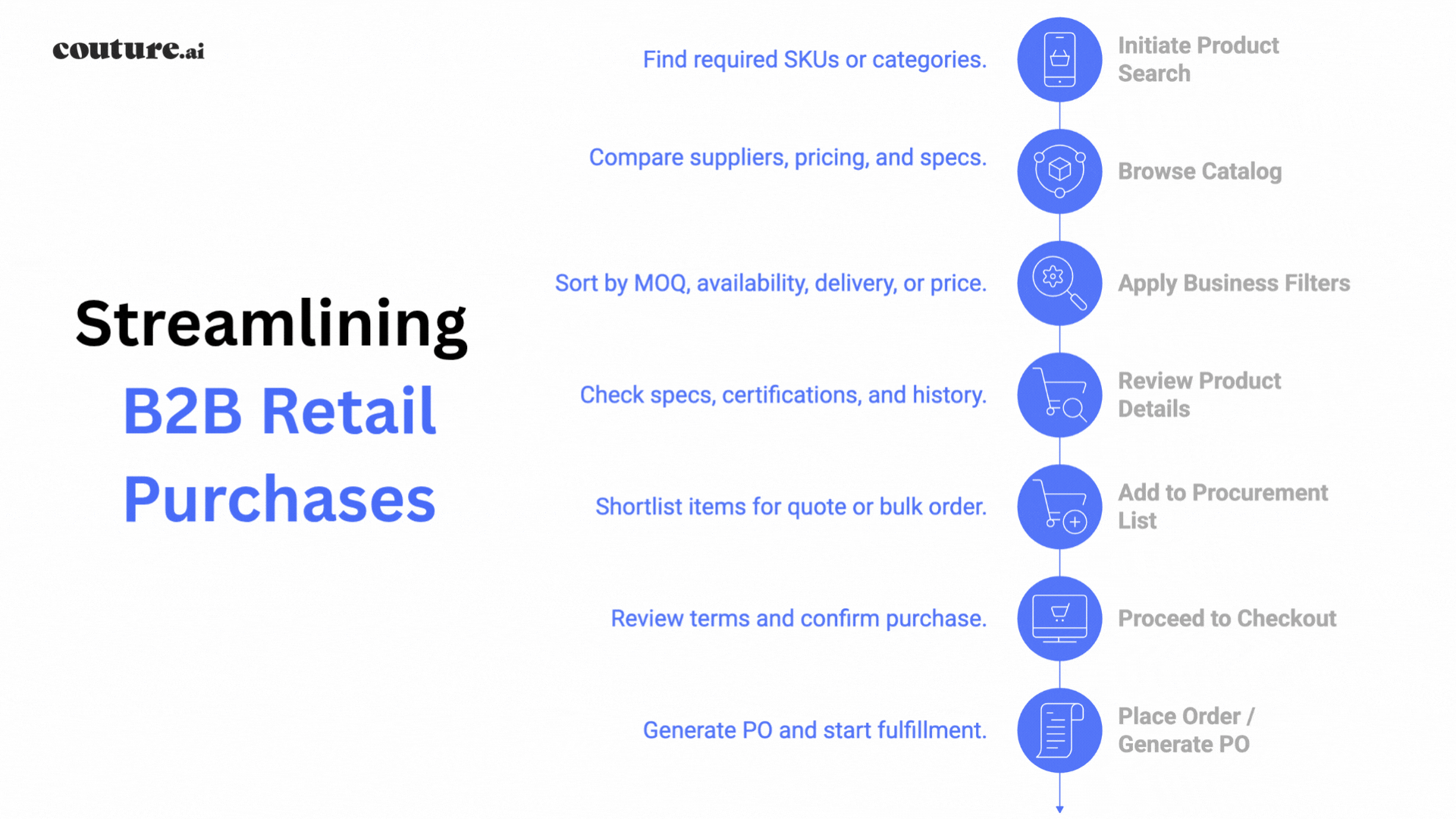Nov 13, 2025 | Couture AI Team
It's Thursday morning. You need to place orders with your beverage distributor, dry goods supplier, refrigeration vendor, and two different wholesale grocers before the week gets wild. Each one's got its own portal, different minimum orders, delivery schedules that never quite line up, and pricing that changes based on what you're buying and how much.

Someone on your team is about to lose three hours to this.
Now let's suppose instead: An AI agent that knows your sales patterns, checks what's running low, logs into each supplier, compares pricing and delivery windows, and then just asks you, "Should I place these five orders? Everything arrives Thursday, and I got you 12% better pricing by bundling some items."
That's not a futuristic scene. Some retailers are already doing this.
Agentic commerce could account for approximately $1 trillion in the U.S by 2030. B2C retail sales, with global estimates ranging from $3 trillion to $5 trillion, underscore the immense economic potential of this emerging digital world.
Let it clear something up because everyone mixes this up.
Those chatbots on supplier websites that answer basic questions? Not AI agents. Helpful sometimes, sure, but they're basically FAQ pages.
An AI agent actually does things without you asking. It tracks your bestsellers, notices you're about to run out of something, checks your preferred suppliers' inventory and pricing, figures out the optimal order size to hit free shipping, and then comes to you with a recommendation.
The difference: one waits for you to ask. The other pays attention and handles things proactively.
McKinsey defines agentic systems as those that "plan their actions, use online tools to complete those tasks, collaborate with other agents and people, and learn to improve their performance."
You set up an AI agent with your buying parameters - brands you stock, price limits, delivery requirements, all that. It logs into your wholesalers' portals, browses just like you would, and builds orders based on what you actually need.
Some of your larger suppliers are setting up their own AI agents. So your agent can directly negotiate with their agent.
Your agent: "I need 40 cases of product A, 25 cases of product B, delivered on Wednesday. What's the best price?"
Supplier's agent: "I can do 12% off if you bump product A to 50 cases. Or 15% off if you're flexible on delivery and can take it Friday."
The agent brings you the options, and based on that, you can pick one.
You tell a wholesale marketplace's AI what you need, and it shops across all their suppliers, applies your negotiated rates, and finds the best matches.
Works great when you're sourcing something outside your regular suppliers or trying to find better pricing on commodities.

Look, most retail operations aren't set up for this yet. Here's what actually needs to change:
Your AI agent needs accurate data to make good decisions. If your POS system and inventory management don't talk to each other, or your data's full of gaps and errors, the agent's going to make wrong decisions.
This means: real-time inventory counts, accurate sales history, proper product categorization, and systems that actually sync with each other.
Your suppliers' rewards programs were designed for human buyers clicking through their portals. AI agents don't overlook points or earning status levels.
What you need: supplier agreements that agents can automatically apply - volume discounts, special pricing tiers, seasonal rates - all structured so an AI can check eligibility and calculate the best deal without human intervention.
If you're still manually applying promo codes or calling your rep for special pricing, that whole process needs to become automated.
Right now, you probably log into supplier portals, click through pages, add items to carts, and manually enter PO numbers.
For AI agents to work, suppliers need to offer API and MCPs access - basically, a way for your agent to place orders programmatically. Some of your larger wholesalers are already moving in this direction.
This often means significant renovation of existing systems, not just surface-level changes
Here's something nobody talks about enough: right now, someone with login credentials places orders. Pretty straightforward.
Most retailers haven't thought through these questions yet. You're going to need programmable spending policies, agent authentication separate from user logins, and probably new conversations with your payment processor.
If you've got brick-and-mortar locations (and most retailers do), your AI agent needs to know what's happening in-store in real-time.
That means: which location needs what, what's sitting in your back room, what customers are asking for that you're out of, and what's about to expire.
A lot of retailers have decent inventory systems for their main warehouse, but terrible visibility into what's actually on shelves across multiple locations. That disconnect kills the whole point of having an agent.
Can your AI agent handle a problem delivery? Process a return? Switch suppliers mid-order if someone's out of stock?
Most retail supply chains still require phone calls and emails when something goes wrong. That's a bottleneck.
You need APIs that let agents track deliveries, modify orders, flag quality issues, process returns, and automatically source from alternate suppliers when needed.
Research from Gartner indicates that by 2028, AI agents will handle nearly 20% of online retail transactions. And B2B wholesale is probably going to move even faster because the orders are more repetitive and data-driven.
The point is letting AI handle the repetitive ordering - the weekly order that's basically the same every time, the regular goods restock, the predictable seasonal items.
That frees up your actual humans to focus on what matters: negotiating better contracts with suppliers, finding new products to stock, building relationships with vendors, and handling the weird situations that actually need judgment calls.
At Couture.ai, we're helping retailers set up the infrastructure for this shift. That means connecting your POS and inventory systems, building interfaces that let agents access your data, and figuring out which parts of your ordering process are ready for automation.
Let's talk about what this shift means for your specific business and how to position yourself to capture the opportunity. Book a personalized demo now!
Subscribe to get the latest updates and trends in AI, automation, and intelligent solutions — directly in your inbox.
Stay Informed: Insights and Trends from Couture AI
Reduce operational complexity, improve planning accuracy, and deliver smarter retail execution with Couture AI.